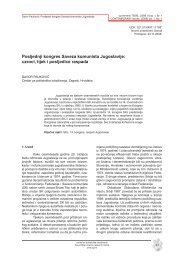ISSN 1847-2397 godište II broj 1 2009. | volume II number 1 2009
ISSN 1847-2397 godište II broj 1 2009. | volume II number 1 2009
ISSN 1847-2397 godište II broj 1 2009. | volume II number 1 2009
- No tags were found...
You also want an ePaper? Increase the reach of your titles
YUMPU automatically turns print PDFs into web optimized ePapers that Google loves.
Sabina Stan: The Discourse on the “Crisis of the Health Care System”suvremene TEME, (<strong><strong>2009</strong>.</strong>) God. 2, Br. 1CONTEMPORARY issues, (<strong>2009</strong>) Vol. 2, No. 1Marketisation constitutes one of themost frequent topics tackled in the articles analysedin this article. More than a third of the articles(48/139) do not restrict themselves to diagnosingthe health care system, but also givesolutions by either proposing or opposing itsradical change through marketisation. Graphic 2shows that, after 1998, in parallel with the rise ofa new vision of the crisis and the system, thereis also a rise of marketisation as one of the mainconcerns of the crisis discourse. 41Moreover, “marketisation” becomes themain solution promoted by the crisis discourse.Of the total <strong>number</strong> of articles explicitly referringto marketisation (48), only a third opposes it(16), whereas the large majority adopts positionsfavourable to it (32 articles).Interestingly, the marketisation debatedoes not neatly follow the right-left divide amongthe chosen dailies. Indeed, if La Presse is themost fervent promoter of marketisation, with 22pro marketisation articles against only 4 countermarketisation articles, Le Soleil shows a morebalanced picture, with a corresponding score of4 vs 4. However, most surprisingly, Le Devoirdoes not oppose marketisation with the samegusto as La Presse promotes it. Indeed, with ascore of 6 vs 8, it engages, considering its leftleaningrenown, only half-heartedly in the attackon marketisation. This indicates that the causeof marketisation has transgressed classical politicalfrontiers, as its progress is facilitated notonly by its strong promotion in right-leaning dailiesbut also by the left-leaning daily’s reluctanceto engage with the topic as well as by its frequentembrace of it.The cutting across of political frontiers ofthe pro-maketisation position is compounded byits discursive fuzziness. Indeed, “marketisation”covers a rather ambiguous discursive place, asarticles do not, contrary to academics and policymakers, dwell on elaborate or even on any definitionat all. As we have seen, in the articles analysedhere, marketisation is reflected in calls for“giving more place to the private sector”. It is becauseof the inherent fuzzy discursive contoursof these calls that they can resonate both withpositions, advocated by some self-alleged leftwingQuebec experts, that defend the introductionof a market-like governance (that would re-41 The only time after 1998 when marketisation wasno longer an issue in the crisis discourse is 2003.At this point, an expectative attitude towards the policies ofthe new govern-ment (Parti libéral, elected in April 2003) andthe quasi-monopolisation of the discoursive domain by theSARS crisis contributed to what can be seen for now a paranthesisin debate.linquish to the private sector only subcontractedauxiliary services that are not seen as “the core”of health care services), and with the positions,advocated by right-leaning experts, that militatefor the outright privatisation of the system by allowingprivate hospitals and clinics and privateinsurance. 42It can thus be said that the discourse onthe crisis of the health care system, as developedin Quebec written media, serves mainly asa vehicle for the promotion of the idea of marketisationof the health care system. Indeed, whilethe crisis discourse was not produced solely byright-leaning privatising voices in media, politicaland expert circles, and left-leaning analystshave not managed to prevent the imposition andfinal dominance of a marketisation stance withinthis discourse and within the larger policy arena.By constructing the system as a public domaindisjointed from private health care provision,and, as such, prone to crisis, the crisis discoursemade space for a neat articulation of marketisationpropositions.Moreover, “marketisation” becomes themain solution promoted by the crisis discourse.Of the total <strong>number</strong> of articles explicitly referringto marketisation (48), only a third opposes it(16), whereas the large majority adopts positionsfavourable to it (32 articles).Interestingly, the marketisation debatedoes not neatly follow the right-left divide amongthe chosen dailies. Indeed, if La Presse is themost fervent promoter of marketisation, with 22pro marketisation articles against only 4 countermarketisation articles, Le Soleil shows a morebalanced picture, with a corresponding score of4 vs 4. However, most surprisingly, Le Devoirdoes not oppose marketisation with the samegusto as La Presse promotes it. Indeed, with ascore of 6 vs 8, it engages, considering its leftleaningrenown, only half-heartedly in the attackon marketisation. This indicates that the causeof marketisation has transgressed classical politicalfrontiers, as its progress is facilitated notonly by its strong promotion in right-leaning dai-42 It could be further argued that the distinctionmany promoters of the new public management make betweenthe “introduction of market mechanisms” (such ascompetition, contracts and outsourcing of auxiliary servicesto the private sector) and outright “privatisation” (which theydefine as the introduction of private hospitals and cabinetsand of private insurance) is in itself a manner of promotingnot only marketisation, but also at least a partial privatisationof the health care system (in the sense that some parts ofthe system are brought under the control of private interests).See, for such an alternative view on the privatisation of thehealth care system, Armstrong and Armstrong (1996, 2008)and Lewis et al. (2001).centar za politološka istraživanjathe political science research centrewww.cpi.hr25
















